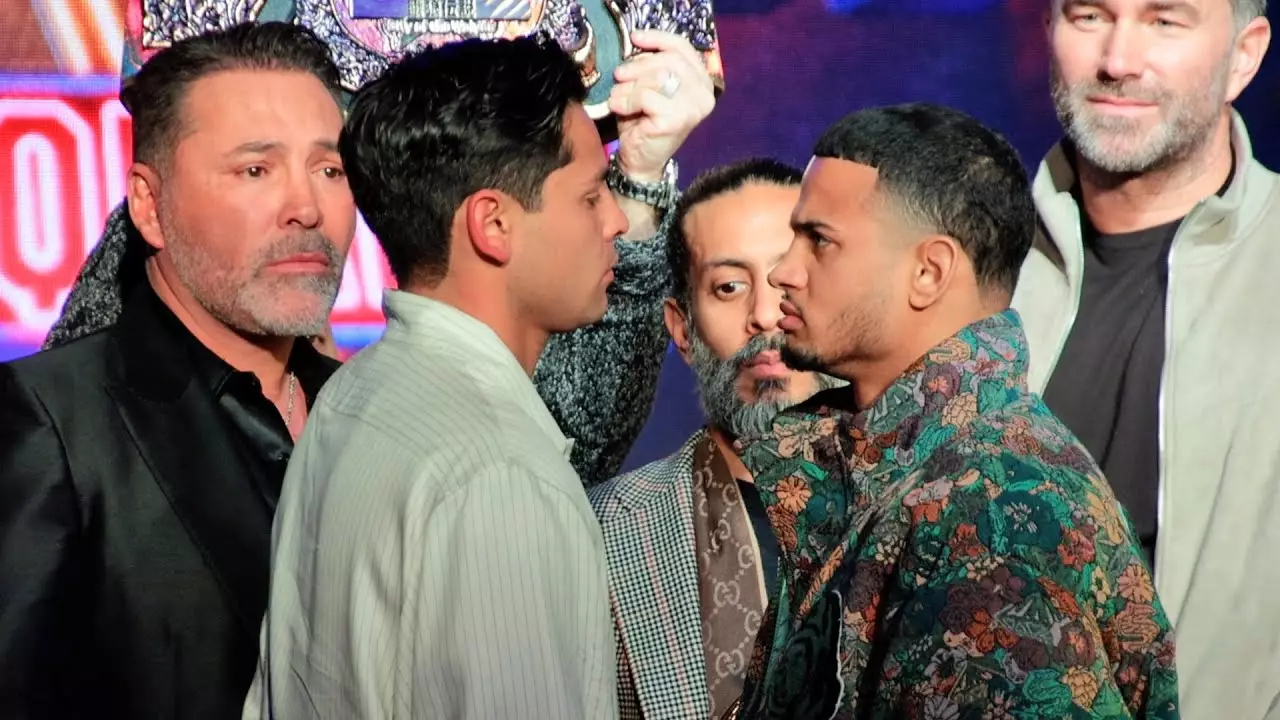In a staggering announcement that has sent shockwaves through the boxing world, Ryan Garcia has disclosed that he is set to earn around $20 million for his upcoming fight against Rolando ‘Rolly’ Romero on May 2nd at the epicenter of New York’s Times Square. This astronomical figure raises pivotal questions about the current landscape of boxing, especially regarding Garcia’s motivations and the implications of such a hefty paycheck for a fight many perceive as a mere precursor to bigger challenges ahead.
Garcia’s substantial earnings reflect more than just his capacity as a boxer; they mirror the evolving dynamics of the sport. In a time when talent should dictate value, the prevalent trend seems to indicate that financial negotiations often overshadow intrinsic merit. This positioning indicates that Garcia’s allure—his social media influence and charismatic personality—plays as much a part in this massive payday as his impressive athleticism. With a professional record of 24 wins and just one loss, and an impressive knockout ratio, Garcia’s stature as a formidable contender is well established. Yet, the question lingers: has the business of boxing become too focused on monetary gain over sporting intrigue?
The Role of Turki Alalshikh in Garcia’s Career
The upcoming fight and Garcia’s lucrative contract are largely attributed to Turki Alalshikh, a figure emerging as a critical player in boxing. Garcia didn’t shy away from showering praise on Alalshikh, crediting him not only for arranging his match with Romero but also for facilitating a rematch with Devin Haney, which is set for later in the year. Garcia’s admiration reveals the intricate tapestry of relationships underpinning high-stakes fights in boxing today.
“I think he’s going to take over,” Garcia declared regarding Alalshikh, emphasizing the latter’s strategic acumen in orchestrating matches that not only draw audiences but also maximize earnings for fighters. This innovative approach to managing fights might pressure traditional models—challenging an era where negotiating the best bouts seemed to rely heavily on mutual understanding between promoters and fighters. It’s clear that with Alalshikh’s involvement, Garcia sees an opportunity to evolve his career trajectory and navigate the sport’s complex waters more effectively.
The Weight of Expectations: May 2nd’s Stakes
While Garcia seems firmly positioned to claim victory against Romero, who holds a lackluster 1-2 record in his recent fights, Haney’s path is cluttered with uncertainty. Haney faces a more difficult challenge in Jose Ramirez, a seasoned fighter with a formidable reputation. The potential outcomes of these concurrent bouts prompt intriguing speculation: do Garcia and Haney need to emerge victorious on May 2 for their planned rematch to materialize in October? If winning isn’t a prerequisite, this eases the pressure significantly, allowing Garcia to focus on the task at hand, and perhaps brings fans a less predictable range of outcomes from the card.
Garcia’s prospective earnings raise further inquiries regarding the financial arrangements for the co-feature, where Haney will feature against the dangerous Ramirez. As boxing continues to draw gigantic figures through sponsorships and broadcast deals, there remains a disparity in earnings among fighters that many view as unjustified. The sport must grapple with the reality that while one fighter could earn a fortune, another may sweat just as hard with yields that barely cover training expenses. Observable inequalities muse on the meritocracy—or lack thereof—within prizefighting.
Shifting the Focus in Boxing: A Call to Action
Perhaps now, more than ever, boxing stands at a crossroads. The emphasis on financially driven spectacles overshadows traditional sporting integrity. Gonzalez’s significant paycheck should ideally be a reason for celebration in sports, illustrating how far the industry has come; however, it also serves as a wake-up call to address discrepancies where certain fighters—as proven talents—are relegated beneath the glare of financial favoritism based on marketability and hype.
Moving forward, the boxing community must emphasize a shift towards recognizing talent in tandem with market savvy—a delicate balance that could redefine how the sport operates. As fans, we must push for accountability, challenging promoters and regulatory bodies to favor the athletes’ skills over their commercial appeal. Only then can boxing regain the integrity that has been lost amid a flurry of titanic paychecks and promotional theatrics.

